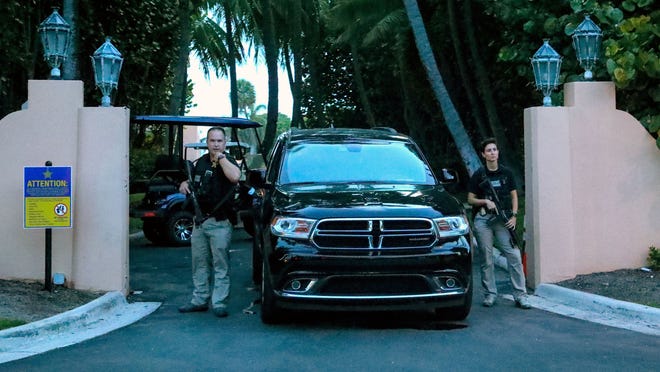- Trump’s lawyers called the criminal investigation ‘unprecedented and misguided.’
- The Justice Department asked the judge to allow the criminal probe during the special master review.
Donald Trump argued against allowing the Justice Department to review documents seized from Mar-a-Lago while a special master independently reviews the records, under a court filing Monday that called the investigation “unprecedented and misguided.”
U.S. District Judge Aileen Cannon temporarily halted the department’s criminal investigation while the independent review is conducted. But she allowed of the Office of the Director of National Intelligence to continue its security assessment of the documents.
Lawyers for Trump and the Justice Department submitted four names Friday of potential special masters, although they didn’t agree on any. Cannon hasn’t set a deadline for when she will name a special master she authorized last week.
The Justice Department filed a notification it would appeal her decision. In the meantime, the department urged Cannon to lift the restriction on investigators reviewing the documents because the same officials who investigate criminal cases are intertwined with those contributing to the intelligence review.
But in response Trump’s lawyers, in their filing Monday, said Cannon’s ruling for a special master could restore “order from chaos” in the investigation they argued sought to criminalize Trump’s possession of his own presidential records.
“This investigation of the 45th President of the United States is both unprecedented and misguided,” the filing said.
More:The search at Trump’s Mar-a-Lago estate was a month ago. What we’ve learned since.
Trump’s lawyers also dismissed the urgency of the investigation, saying “there is no indication any purported ‘classified records’ were disclosed to anyone,” according to the filing. The documents were locked in a storage room at Mar-a-Lago, which is secured by the Secret Service, Trump’s lawyers argued.
But former national-security officials told USA TODAY the categories of classified documents found at Mar-a-Lago would typically be read only in secure rooms authorized by the government and then locked in a safe. Federal authorities said there were no government-authorized rooms for classified documents at Mar-a-Lago.
FBI agents found 54 “secret” and 11 “top secret” documents among 11,000 documents seized at Mar-a-Lago. Another 48 empty folders had classified banners and 42 folders were marked “return to staff secretary/military aide.”
